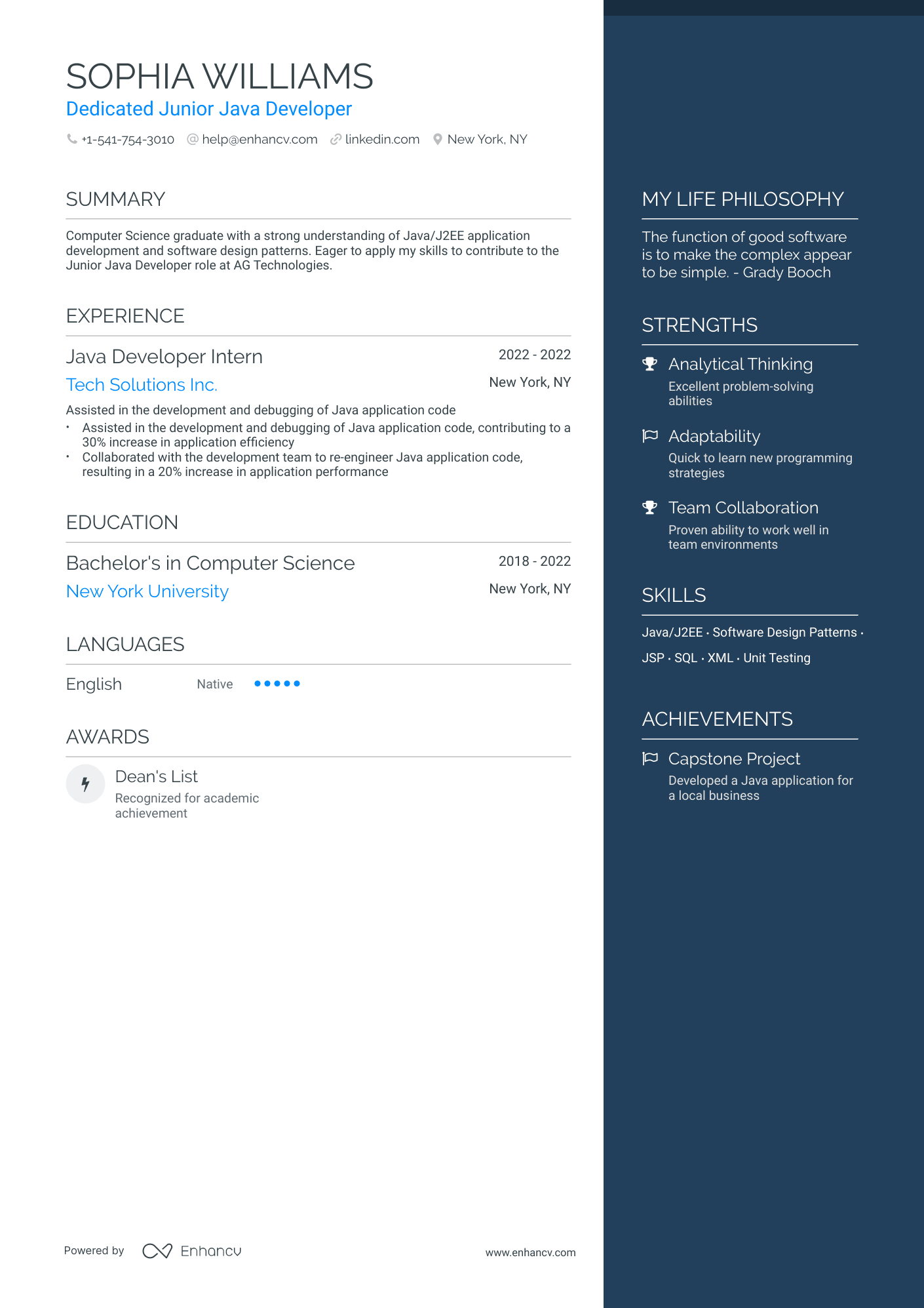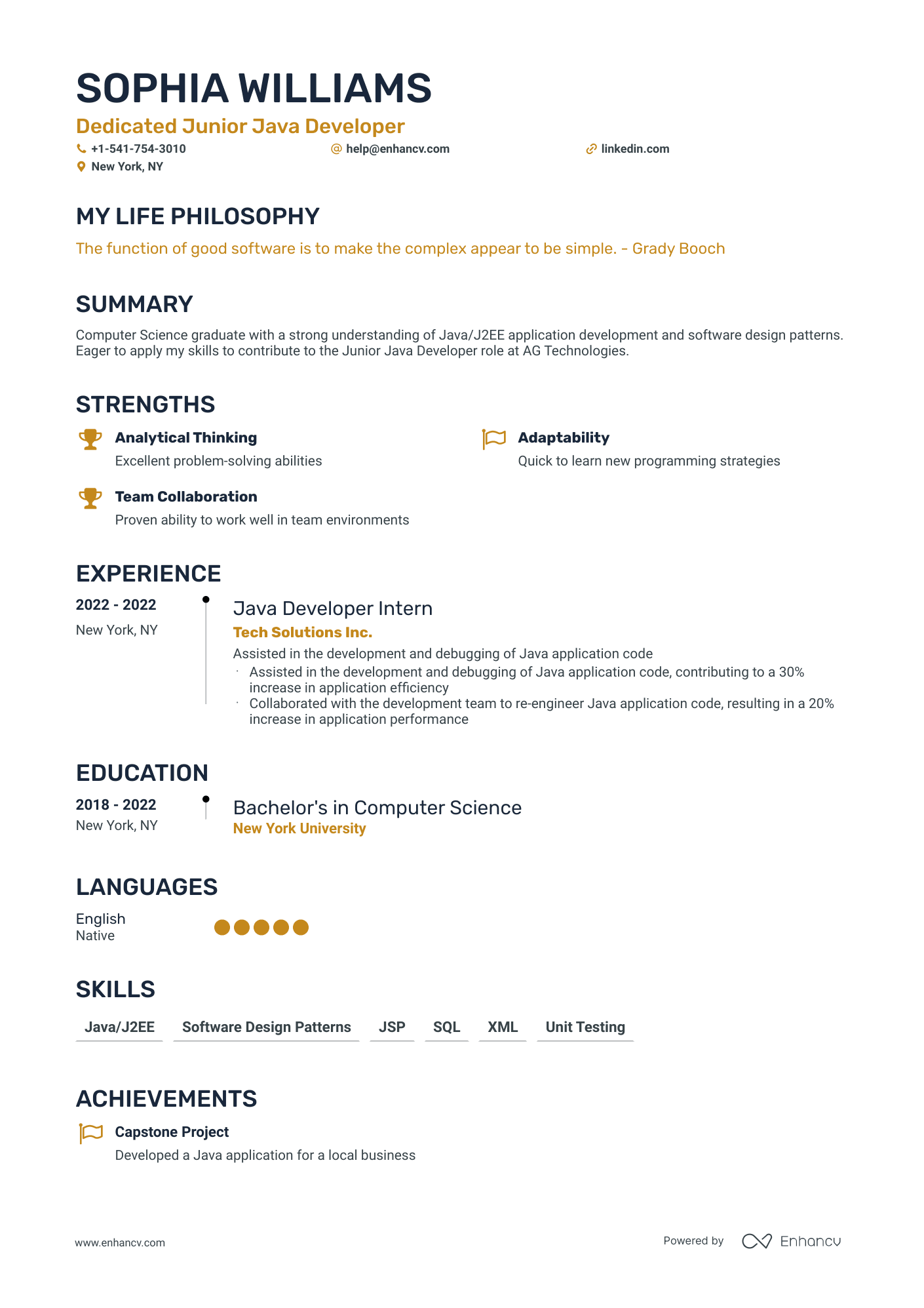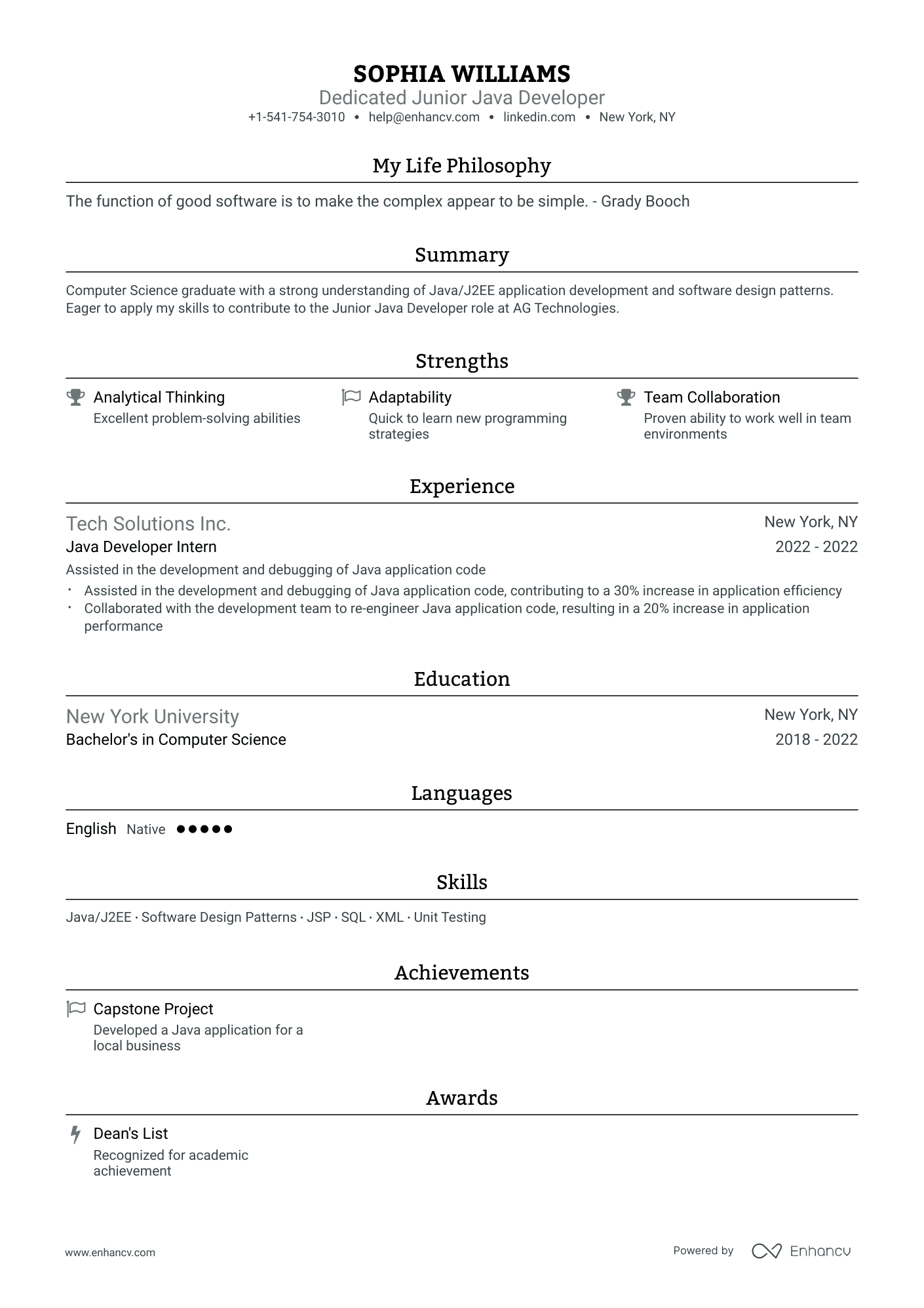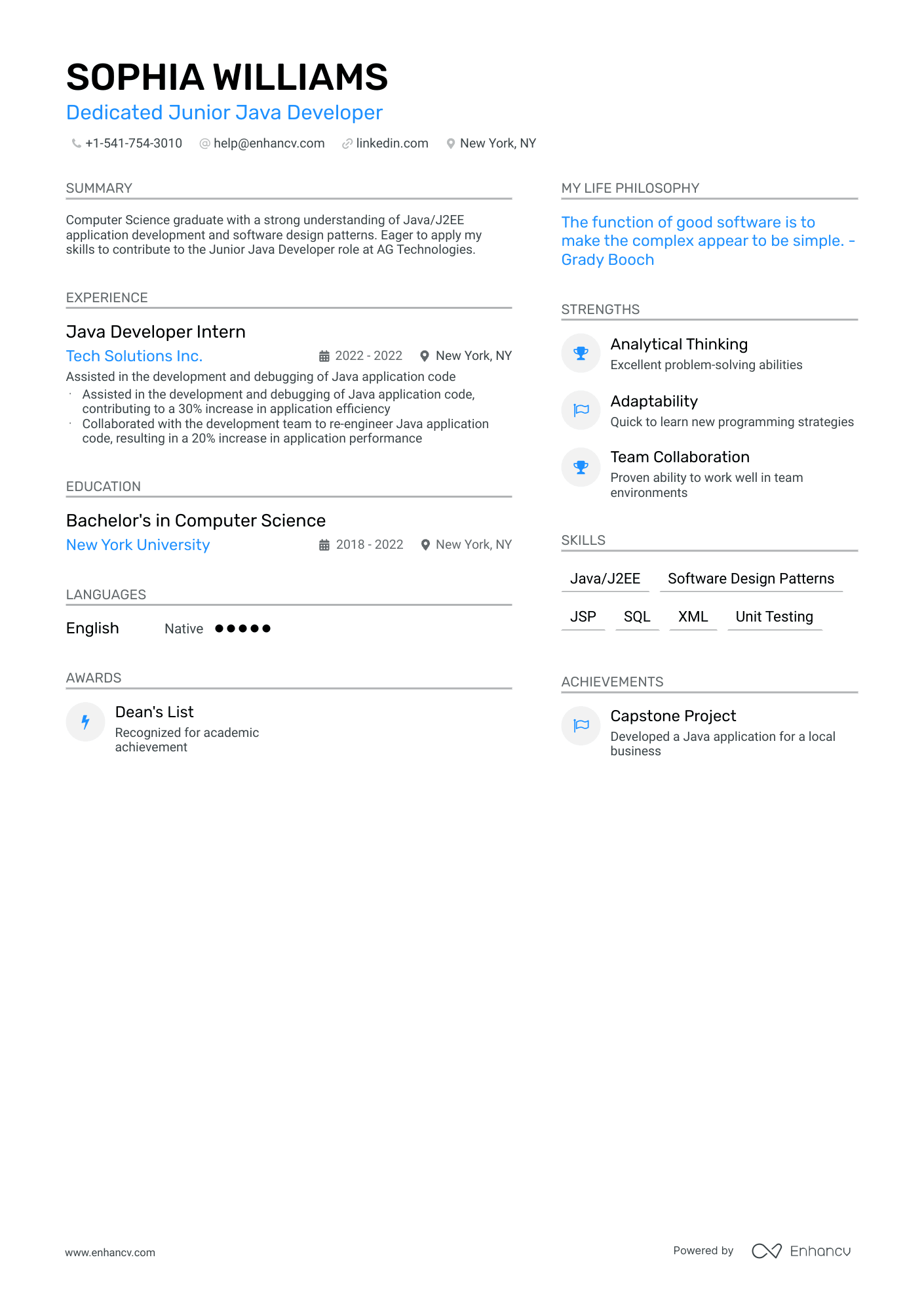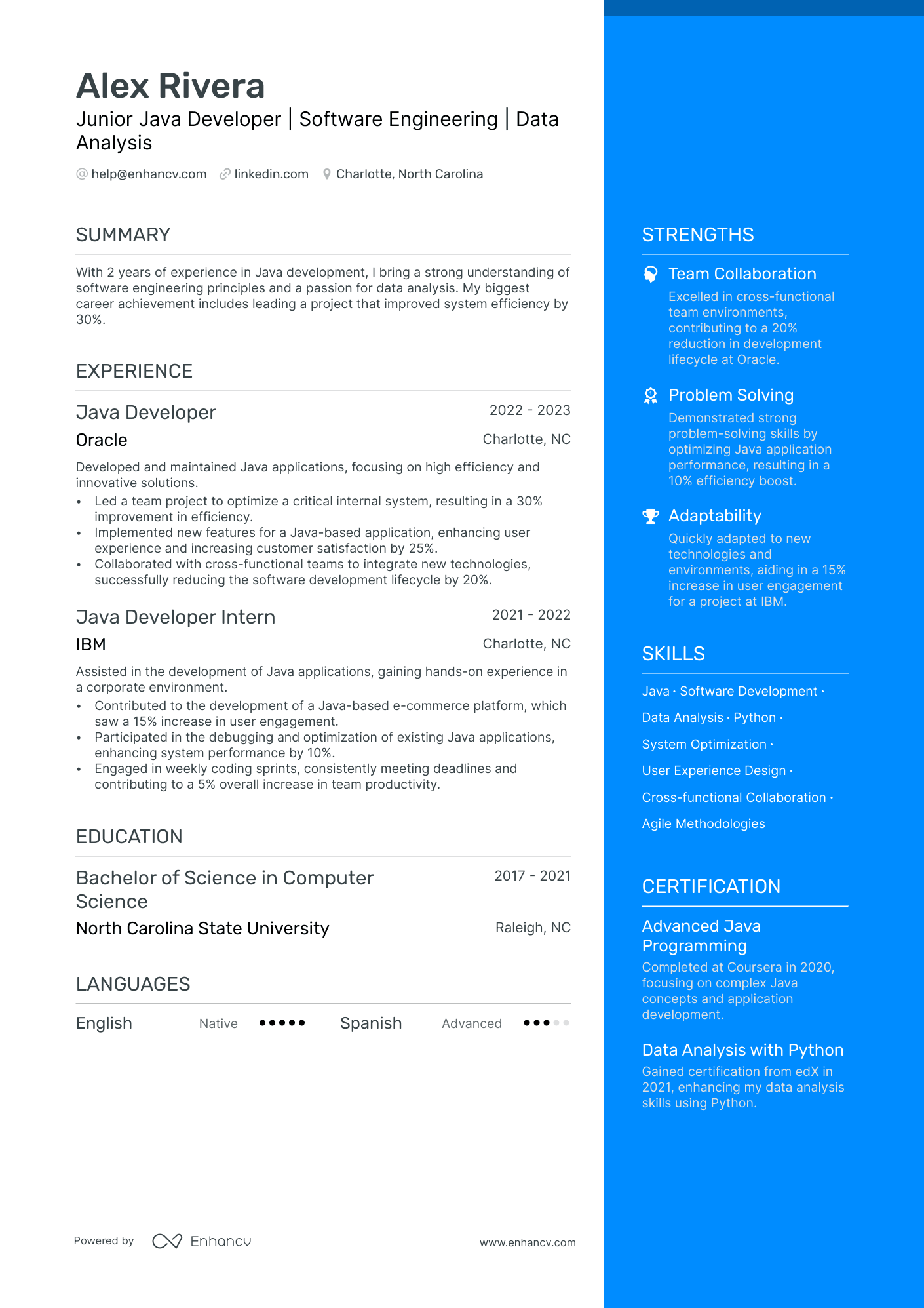The Java programming language is quite versatile. From web applications to cloud computing, to mobile development, it is, and will likely continue to be, in demand on the job market for years to come.
However, starting off as a Java developer in 2025 is harder than ever.
With tech becoming more and more desirable as a career path and more people learning Java than ever, as a junior Java developer you’ll be competing with thousands of other candidates.
Not to mention AI joining the race as a pretty good substitute for junior devs. So to stand out, you will need a really good resume.
In this article we’ll teach you how to craft yours and give you real Java resume samples to base it on.
We’ll show you:
- how to format your resume
- how to tailor it to what recruiters want to see in junior Java developer
- what sections to add
- how to write each section so it's impactful
- what the best skills and achievements for you to add are
- how to write a junior dev resume without previous experience
For other guides on similar topics, check out:
Junior Java developer resume example
- Tailored Experience to the Role: The resume includes specific job experiences as a Java Developer and Java Developer Intern, directly relevant to the junior Java developer position. This demonstrates the applicant's direct experience in the field.
- Quantifiable Achievements: Each bullet point under the job experiences includes quantifiable results, such as "30% improvement in efficiency" and "25% increase in customer satisfaction." This approach effectively showcases the impact of the applicant's work.
- Relevant Skills and Courses: The Skills section is tailored to include both general and specific skills required for a Java Developer role, like "Java," "Software Development," and "System Optimization." Additionally, the Courses section highlights relevant certifications, such as "Advanced Java Programming" and "Data Analysis with Python," which are crucial for the role.
- Unique Sections Reflecting Personality and Values: Sections like "Most Proud Of," "Strengths," and "Passions" give a personal touch to the resume, presenting the applicant as a well-rounded individual with interests and achievements beyond their professional skills.
How to format a junior Java developer resume
The right resume format will help you make a good first impression.
Sure, hiring managers want to see tech skills and expertise in their Java developer candidates, but they also need to know you are detail-oriented and professional.
As a junior Java developer, here’s how to format your resume so it makes an impact:
- Use the reverse chronological format: the most widely used formatting, the reverse chronological resume format is when your latest job experience is listed at the top, followed by the rest in reverse chronological order. It highlights your career progression, even if it is on the shorter end as a junior Java developer.
- Add a header: the header sits at the top of your resume and includes your name, contact information, and photo. A good header is clear, easy to read, and stands out immediately.
- Keep it one page long:it's ok if your resume isn't too long. In fact, it's a good thing. Recruiters tend to spend mere seconds skimming resumes, so keeping yours short and to the point will keep them focused. Still worried you're left with too much empty space? Add some professional projects you've worked on (and still keep it one page long).
- Save your resume as a PDF file: unless otherwise specified, go for a PDF for your resume. It keeps all your text and image formatting intact, it’s easily readable on any machine and software, and it’s easily scannable by applicant tracking software (ATS).
Be mindful of regional differences in resume formats – a Canadian layout, for instance, might vary.
Is your resume good enough?
Drop your resume here or choose a file. PDF & DOCX only. Max 2MB file size.
The top sections on a junior Java developer resume:
- Technical Skills: Showcases proficiency in Java and related technologies.
- Education and Certifications: Highlights relevant degrees and Java certifications.
- Work Experience: Demonstrates practical Java development experience.
- Projects and Portfolio: Displays hands-on Java projects and contributions.
- Professional Summary: Offers a brief overview of Java development skills and goals.
What recruiters want to see on your resume:
- Proficiency in Java and related frameworks: Essential for building and maintaining Java-based applications.
- Understanding of object-oriented programming: Critical for effective Java development and code organization.
- Experience with databases and SQL: Important for integrating Java applications with database systems.
- Familiarity with version control systems, like Git: Necessary for collaborative development and code management.
- Problem-solving skills and logical thinking: Vital for debugging and developing efficient Java solutions.
How to write your junior Java developer resume experience
Writing your job experience resume section is probably giving you new levels of anxiety.
As a junior Java developer in this competitive field, it’s normal to wonder if your experience is enough.
But we promise, even if you don't have much experience to write about, there are still ways to make your experience section impactful.
Here's how...
- List your job experiences one by one in the reverse chronological order we mentioned above.
- Junior Java developers usually have up to three years of experience in their field, so start with that.
- Add everything that's part of your professional Java developer career journey so far. That includes short-lived junior Java dev roles, internships and freelance work as well.
- Add the position you held, the name of your employer, and the duration of time you spent there.
- Under each entry add four to five bullet points detailing your experience.
As an example...
Here’s what your junior Java developer Experience section shouldn’t look like:
- •Wrote, maintained, and tested Java code
- •Mainly worked on e-commerce project
- •Participated in code reviews
- •Participated in the debugging process, using AI
What’s wrong here:
- The descriptions are too short and vague.
- The candidate is listing general job responsibilities as opposed to things they excelled at.
- The candidate doesn’t give any examples or evidence of impact made at the company.
- They don’t mention what technologies they used the most.
Here’s how your Experience section should look like:
- •Worked exclusively on high-impact Java desktop and web applications, using Java EE 8, Spring Boot, and my own unit tests
- •Developed a custom e-commerce payment method, increasing customer satisfaction by 52%
- •Supported team members in code reviews, cutting new code commit timeframes in half
- •Implemented changes to bug-finding AI algorithm, raising deliverable code quality by 23%
What’s right here:
- The candidate gives specific information on what their work was focused on.
- They name the technologies they’ve worked with most.
- To each completed task or project mentioned, they add context and impact: “increasing customer satisfaction by 52%”, “cutting new code commit timeframes in half”, and “raising deliverable code quality by 23%”.
- This example shows the difference between:
- “Wrote Java code” (wrong) and “worked on high-impact Java applications, using Java EE 8 and Spring Boot” (right).
- “Worked on e-commerce project” (wrong) and “developed custom e-commerce payment method, increasing customer satisfaction by 52%” (right).
- “Participated in the debugging process, using AI” (wrong) and “implemented changes to bug-finding AI algorithm, raising deliverable code quality by 23%” (right).
How to quantify impact on your resume
A common mistake people make is just listing their job responsibilities.
Hiring managers and even non-technical recruiters already know what a job as a Java developer entails.
So instead, focus on your accomplishments at each job.
Before writing a bullet point under your job entry, ask yourself two questions:
1. What did I contribute?
2. What special acknowledgments was I given?
Did you add key new features to the app you were part of developing?
Were you put in charge of database integrations due to you being especially skilled at Big Data and SQL?
Were you promoted to junior Java developer after spending only two months as an intern as opposed to the regular six?
Did you excel at learning about and creating cloud microservices and APIs?
List out everything that makes you stand out from every other person with the same job title of Java developer.
Such as…
- Highlight coding projects: Emphasize any coding projects or tasks, indicating the number of lines of code written or the percentage improvement in efficiency. This demonstrates your hands-on coding skills and your ability to contribute tangibly to software development.
- Quantify problem-solving skills: Include specific instances where you used Java to solve problems, noting the scale of the problem and the effectiveness of the solution. This shows your practical application of Java in real-world scenarios.
- Mention collaborative work: Specify the number of team members in projects you've been part of, highlighting your teamwork and ability to work in diverse groups. This reflects your interpersonal skills and adaptability in a team environment.
- Detail your educational background: List relevant Java courses or certifications, including the number of hours spent or specific achievements. This provides insight into your dedication and formal knowledge in Java.
- Include performance metrics: If applicable, mention any metrics or KPIs you helped improve in past roles or projects. This illustrates your ability to drive results and contribute to business objectives.
- Showcase your testing experience: Detail any experience in testing Java applications, including the number of tests written or bugs found and fixed. This highlights your attention to quality and detail.
- Specify tools and technologies: List Java frameworks and tools you're proficient in, quantifying your experience level or the duration of use. This demonstrates your technical skills and readiness to contribute effectively.
- Discuss continuous learning: Mention any ongoing learning or upskilling efforts in Java, quantifying the number of courses taken or hours spent. This shows your commitment to staying current in the field.
Make sure to add quantifiable data to support your accomplishments whenever possible.
Use expressions like “Raised X by X%.”, “Completed Y in half the expected timeframe.”, and “Implemented new code debugging feature, raising team productivity by X%, and cutting project costs by X%.”
How do I write a junior Java developer resume with no experience
You want to kick-start your career as a Java developer without previous dev experience?
No worries, you can still create a killer resume tailored to the junior Java developer position, that will get you calls from recruiters.
Here’s how:
- Focus on your transferable skills
List your work experience, even if it’s not as a Java developer. But phrase it in a way that emphasizes what skills and achievements from those experiences will be useful in your future career as a Java developer.
These are your transferable skills.
Emphasize any project or task that had you tinkering with code, working with developers, using complex software, or anything else even remotely related to software engineering.
For example, say you have experience as a tech recruiter. You may not have written any code yourself, but all you’ve learned about tech while working at a tech company and talking to developers on a daily basis is exactly the transferable skills and knowledge employers want to see.
- Emphasize classes, courses, bootcamps, internships
Did you spend a summer in an engaging full-time Java bootcamp?
Did you complete any in-person or online courses in software engineering or computer science (Coursera, Udacity, etc.)?
List them all, while focusing on what skills you gained along the way, what complex projects you worked on, and any impressive achievement.
- Showcase your certificates
If you’ve received certificates in tech, computer science, programming, Java, or similar through courses, classes, bootcamps, etc., list them in their own Certificates section.
This way they will stand out and it tells the recruiter you’ve put in the extra work to get these certificates and the skills that come with them.
- Focus on your Java projects
Create a separate Projects section and list every and any project you’ve ever done with Java.
These can be projects from school, university, online courses, bootcamps, internships, or just things you’ve done for fun or practice in your spare time.
List them by name, link to them if you can (GitHub, etc.), and describe what each one was about in one-two short sentences.
Make it clear what technologies you’ve used on each project, i.e. “Java SE 9”, “Spring”, “Azure”, etc.
- Highlight your skills
In a separate Skills section list all your Java dev related skills that you already have.
For example: Java SE 11, Java SE 17, Azure, Oracle, Git, Jira, Spring, Python, Agile Methodologies, REST APIs.
And speaking of skills…
How to list your hard and soft skills on your resume
Here’s what you need to know about your junior Java developer skills resume section…
There are two types of skills:
- Hard skills: specific, tangible, evidence-based skills, usually in terms of some kind of software proficiency or knowledge in a specific field.
- Soft skills: people skills, things you are good at that are more general, like leadership and time management.
The best way to list your skills on your junior Java resume is…
- Create a separate Skills section
- List your hard and soft skills one by one
- Phrase them like nouns as opposed to verbs: “time management” vs. “managing my time”.
- Focus on your hard skills more. Hard skills are more relevant for junior Java developer job seekers. Do mention the soft skills you excel at, but list more of your hard, technical skills.
- Add skills you’re actually good at. Don’t add anything that you just think you might get good at eventually. You will be expected to back up your listed skills at an interview and at the job itself.
- Center around skills that are most relevant to Java development. Apart from the obvious ones, focus on other OOP languages you know and software/environments, in which Java is used.
- Tailor your Skills resume section to the junior Java job ad you’re applying to. Check out what skills and knowledge they’ve listed in their requirements section. They do vary a bit from one Java job to another. If the job ad says Spring, add Spring. If the job ad says RESTful APIs, add RESTful APIs. That is, if you do have those as a skill, of course.
It’s also important to keep your resume ATS-friendly. Lots of big companies use ATS (applicant tracking software) to read your resume, having it sort you closer to the ideal candidate profile.
So you want your resume to match as closely as possible in keywords to the junior Java developer job ad you’re applying for. If the skill listed as a requirement in the job ad is spelled like “project management”, then you should also spell it as “project management”, as opposed to “project managing”, “managing projects”, etc.
Now here are the best hard and soft skills you can add to your resume as a junior Java developer:
Best hard skills for your junior Java developer resume
- Java
- Spring Framework
- Hibernate
- Java Server Pages (JSP)
- Servlets
- Java Database Connectivity (JDBC)
- RESTful Web Services
- SOAP Web Services
- SQL and Database Design
- Git and Version Control
- Maven or Gradle
- JUnit and Unit Testing
- JavaScript
- HTML/CSS
- Angular or React (Basic Knowledge)
- JSON and XML
- Apache Tomcat
- Eclipse or IntelliJ IDEA
- Linux/Unix Basics
- Docker (Basic Knowledge)
Best soft skills for your junior Java developer resume
- Problem-solving
- Critical thinking
- Teamwork and collaboration
- Effective communication
- Adaptability
- Time management
- Attention to detail
- Creativity
- Empathy
- Continuous learning
- Resilience
- Organization skills
- Patience
- Emotional intelligence
- Conflict resolution
- Leadership potential
- Client focus
- Decision making
- Self-motivation
- Active listening
How to list your certifications and education on your resume
Hiring managers for junior Java developers will usually be looking for some form of technical formal education, or informal, but accredited, completed form of study and certification.
Here’s how to write them into your resume.
- Create an Education resume section.
- Start with the highest form of formal education you’ve completed or are on the way to completing. List the rest from there.
- Write the name of the degree.
- Write the name of the school/university.
- List its location.
- Add the timeframe of you studying there.
- List your major projects completed during this time. Capstone project included, but also anything that had you writing Java code preferably.
- List what technologies you’ve learned about and used while studying there.
- Add any sort of award or impressive accomplishment that you may have. This includes your GPA score, as long as it’s higher than 3.5 on the 4.0 scale.
No formal education to show? List any bootcamp or intensive course you’ve completed in Java development, or computer science in general. The steps above on how to do that still apply.
As for certifications, here’s how to add those to your resume as a junior Java developer:
- Create a separate Certificates resume section.
- Start with your most recently acquired certificate. List the rest from there.
- Write the name of the certificate.
- Make sure the name is written in both its full and abbreviated form. Some non-technical recruiters might not know what the abbreviation stands for, not to mention that this would make your resume even more ATS-friendly.
- Name the issuer of the certificate.
- Add the date it was received and its date of expiry if it has one.
- If any have expired, renew them if possible before adding them to your resume. Recruiters want to know their candidates are staying up-to-date with the ever-changing tech field.
- Stick to certificates relevant to Java or software engineering in general. Adding your advanced cooking class certificate is unnecessary.
Here are the top few certifications you can have as a junior Java developer:
Best certifications for your junior Java developer resume
How to write your junior Java developer resume summary or objective
Your resume Summary or Objective section is the little paragraph sitting at the top of your resume, usually right under your professional title.
It’s a short statement about you as a professional.
It’s called and worded as a resume Summary if it summarizes your career path thus far, mentioning one or two top skills and achievements.
And it’s called and worded as a resume Objective if it states what your future career goals are.
If you have any prior experience as a junior Java developer or intern, we suggest you use the Summary.
If you have no prior Java experience to speak of, we suggest you use the Objective.
Here’s what to avoid in your junior Java developer resume Summary section:
The wrong Summary example:
- Doesn’t specify years of experience.
- Lists every skill the candidate has, instead of focusing on the ones they’re best at.
- Is too general: the candidate lists all the things they’ve worked on, instead of focusing on what they excelled at.
- Doesn’t give any example of achievement or any sort of specific contributions the candidate has made.
In contrast…
The right Summary example:
- Tells the reader exactly how much work experience the candidate has.
- Mentions the additional 4 years of practical experience, likely from personal projects, freelance work, university, or similar.
- Emphasizes what the candidate has the most experience in when it comes to Java development: “cloud and on-prem environments”, “RESTful APIs and microservices”, and “latest Java SE and Spring Boot versions”.
- Highlights only the technologies the candidate is proficient in.
- Gives a specific example of one of their greatest professional achievements: “increased the company’s local office profit by 32%”.
Now let’s look at the dos and don’ts of the junior Java developer resume objective:
The wrong Objective example:
- Is too vague and nonspecific: it gives us almost no information on the candidate; this could very well be a tech recruiter applying for every job they found online, be it in Java development, or pet grooming.
- Gives us irrelevant information: “8+ years of experience in recruitment”. It never ties into the objective of the candidate to become a junior Java developer.
- Doesn’t give any reason or basis on the career shift.
In contrast…
The right Objective example:
- Gives us a clear objective: a candidate with lots of experience working closely with developers, who’s put in the time to learn the Java development basics, and who wants to transfer their skills to a career as a Java developer.
- Mentions relevant skills and tech knowledge: “best coding practices”, “cutting-edge backend Java technologies”, and “Cloud computing”.
- Emphasizes the beginner-level Java education the candidate has gone through: shows they can hit the ground running as a new junior Java developer.
Additional sections for a junior Java developer resume
As a less experienced professional you want to add anything that’s important on your resume.
Adding additional sections to your junior Java developer resume can help you stand out.
Just make sure to keep it relevant to your new desired role.
Here are some bonus sections you can add:
- Strengths: You can emphasize your strengths by naming them one by one and giving them short explanations. Here are examples of some strengths you can include as a junior Java developer: “Problem-Solving”, “Logical Thinking”, “Adaptability”, “Analytical Skills”, “Fast Self Learner”, and “Time & Task Management”. Relate all these strengths to your experience with coding: “self-taught Java developer”, “exceeded KPIs and never missed Sprint deadlines”, “Adapted to new software three times faster than expected”, etc.
- Volunteer Work: Include any volunteer work you’ve done such as mentoring young software developers or developing websites and apps for a charity. List these experiences much like you would your work experience (position, organization, description of project).
- Passions: You can solidify your interest in software development even further by adding a Passions resume section and adding things like “Solving daily coding puzzle tasks”, “Listening to tech podcasts”, “Listening in on Java lectures at the local university”, etc.
Key takeaways
Did we prove that crafting your junior Java developer resume is easy once you have the right tools?
Let’s recap what we’ve covered:
- Format your resume in reverse chronological order; add your contact information at the top; don't go over two pages in length; and save it as a PDF file.
- Include these resume sections: Summary/Objective, Experience, Education, Certifications, Skills.
- If they're lacking content, add extra resume sections such as Strengths, Volunteer Work, and Passions.
- Use a Summary section if you have prior Java development experience. Otherwise, use an Objective section.
- Focus on your top achievements and the skills you're best at.
- Back up your accomplishments with specific examples.
- If you have no previous Java development work experience, focus on your transferable skills from your other jobs.
- Tailor your junior Java resume to the job ad you're applying to: use the same wording in terms of tech terminology, skills, requirements, certifications, etc.
